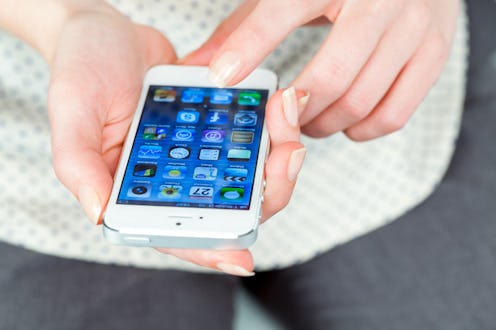
If you're like most people, you probably carry your phone with you wherever you go, whether it's in your pocket, your purse, your backpack, or one of those fancy wallets sized to contain smartphones. If this sounds like you, you might be excited to learn how your iPhone can affect your health in a somewhat unexpected way. As it turns out, your phone is silently doing something that can help you increase awareness of your body and daily habits, even if you didn't deliberately download anything that might do those things. Neat, right?
Here's the big secret (which really isn't much of a secret, so much as it is a silent helper, but you know what I mean): If you have iOS 8 or above, your phone comes pre-loaded with an app called Health — the icon showing a white box with a small heart on the upper right hand corner. Many people have never even launched the app, but Health has the capability to consistently track your steps, count the number of flights of stairs you've climbed, and measure your walking and running distance to help you monitor how much you're moving in a day. Unlike advanced fitness trackers, your iPhone can't quite detect your heartbeat or calories burned (it's usually just hanging out in your pocket, after all), but this function is particularly useful for people trying to make sure they're moving around enough — whether that's hitting 10,000 steps a day or something else.
And you didn't even have to do a thing to start logging those steps! Isn't technology grand?
The Health app is capable of tracking more than just your steps, though. If you want to customize your options, you'll need to do a little adjusting within the app itself. Once you've booted up the Health app, select "Health Data," and then tap "Fitness." Within this category, add whatever you'd like to your dashboard by tapping your desired option and selecting "Show on Dashboard." Then, when you're ready to look at your stats, simply tap "Dashboard," and all the data you enabled for your dashboard will be displayed. Voilà! Your daily exercise and movement is now in your hands.
According to OSX Daily, the Health app doesn't significantly drain your battery, and since you're unable to uninstall it from your phone, you might as well use it (even if you use it mostly out of curiosity). If you have Apple Watch, a lot more of the "Health Data" features are usable, since you can sync them right up with the wearable; for those of us without Apple wrist-bling, though, walking distance, flights climbed, and steps taken will do.
Images: krystiannawrocki/iStock Unreleased/Getty Images; Mehak Anwar/Bustle